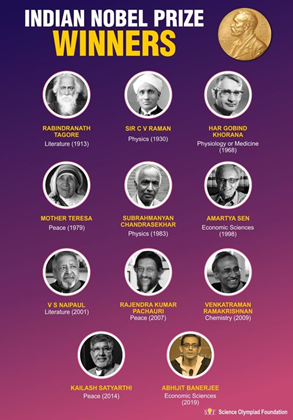Nobel Peace Prize 2023
News: Nobel Peace Prize 2023 awarded to Narges Mohammadi for her fight against oppression of women in Iran.
- Narges Mohammadi has faced repeated arrests by the Iranian regime, totaling 13 times.
- She has been convicted five times and handed a cumulative sentence of 31 years in prison along with 154 lashes.
- Mohammadi’s activism opposing the death penalty resulted in her re-arrest in 2015 and additional years of imprisonment.
- In Tehran, she was sentenced to 16 years’ imprisonment in May 2016 for her role in establishing and leading a human rights movement advocating for the abolition of the death penalty.
- Narges Mohammadi is a staunch supporter of women’s rights, challenging practices that restrict their freedom and dignity, even in the face of persecution, imprisonment, torture, and death.
- She champions freedom of expression and independence and opposes regulations that require women to remain hidden and veiled.
- The Nobel Peace Prize in the previous year was awarded to imprisoned human rights advocate Ales Bialiatski from Belarus, the Russian human rights organization Memorial, and the Ukrainian human rights organization Center for Civil Liberties, symbolizing civil society’s resilience in their respective countries.
|
Noble prize History – The Nobel Prize was established through the will of Alfred Nobel, a versatile figure known as an inventor, entrepreneur, scientist, poet, and dramatist. – Nobel left the majority of his fortune to create prizes in five categories: Physics, Chemistry, Physiology or Medicine, Literature, and Peace. – The prizes were to be awarded to those who had conferred the greatest benefit to humankind during the preceding year. – Alfred Nobel held 355 patents and is notably recognized for inventing dynamite. – The first Nobel Prizes were awarded in 1901, and they have been presented annually since then, with a few exceptions during World War I and World War II. – The Nobel Day, observed on 10 December each year, commemorates Alfred Nobel’s death and serves as the day for presenting the Nobel Prizes to laureates. – In 1968, the Sveriges Riksbank established the Sveriges Riksbank Prize in Economic Sciences in Memory of Alfred Nobel. – Nobel laureates receive a Nobel Prize diploma, a medal, and a document specifying the prize amount, which currently stands at 10 million Swedish krona or approximately $900,000. – The Nobel Prize can be shared by up to three individuals, or in the case of the Peace Prize, it can also be awarded to organizations. – While the Nobel Prize cannot be awarded posthumously, a recipient who dies after the prize announcement may still receive it. – Alfred Nobel designated Swedish institutions to be responsible for selecting Nobel laureates, except for the Peace Prize, which is decided by a committee elected by the Norwegian Parliament. – The Nobel medals cannot be revoked, as per Alfred Nobel’s will and the statutes of the Nobel Foundation. – To become a Nobel Prize laureate, one must be nominated by an eligible nominator, with self-nomination being prohibited. Nomination is typically by invitation only. – Malala Yousafzai, who received the Peace Prize in 2014 at the age of 17, is the youngest Nobel Laureate. – John B. Goodenough, honored with the Chemistry Prize in 2019, holds the record as the oldest recipient at 97 years old. – Marie Curie is the only woman to have been honored twice, receiving the Nobel Prize in Physics in 1903 and the Prize in Chemistry in 1911. – The institutions responsible for selecting Nobel Prize laureates include The Royal Swedish Academy of Sciences, Karolinska Institutet, The Swedish Academy, and a committee elected by the Norwegian Parliament for the Nobel Peace Prize. |





